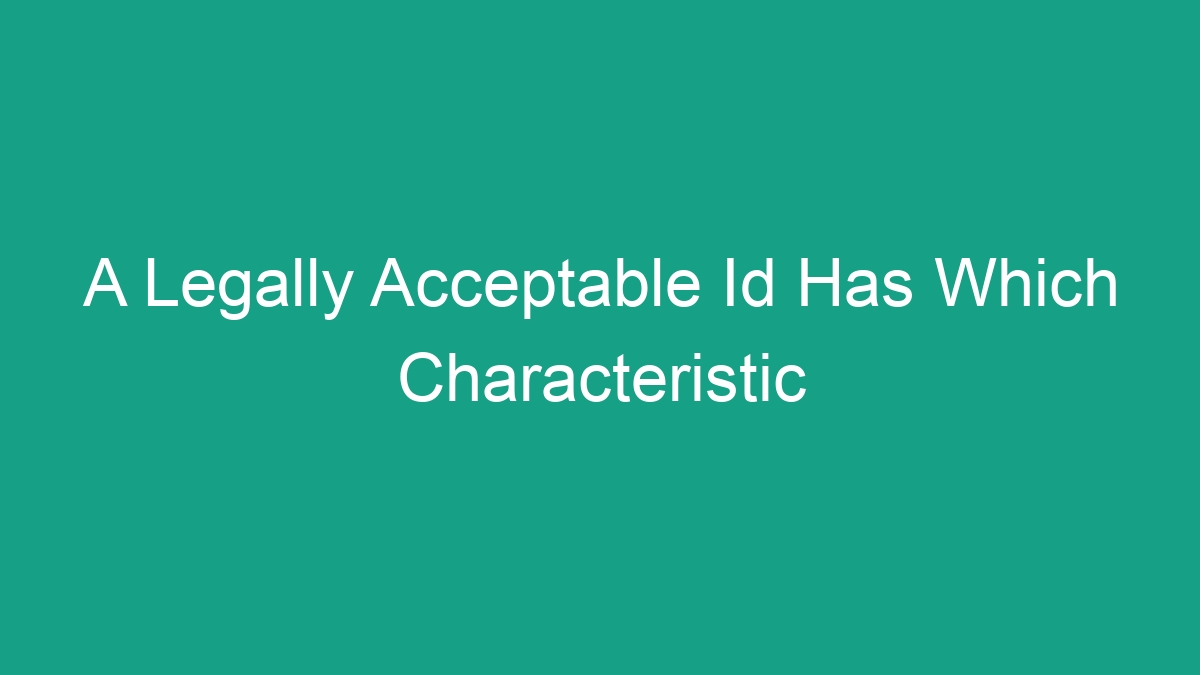
Introduction
When it comes to legal matters such as age verification, identity verification, and access to certain facilities or services, having a legally acceptable ID is crucial. But what exactly makes an ID legally acceptable? In this comprehensive guide, we will explore the characteristic that a legally acceptable ID should have, including security features, government recognition, and more. Whether you are applying for a new ID, or simply want to understand the requirements, this article has you covered.
Characteristics of a Legally Acceptable ID
Government Recognition: One of the most important characteristics of a legally acceptable ID is government recognition. This means that the ID must be issued by a government authority, such as the Department of Motor Vehicles, a passport agency, or another government entity responsible for issuing identification documents. Government-issued IDs are considered reliable because they are backed by the authority and resources of the government. Examples of government-issued IDs include driver’s licenses, state ID cards, passports, and military IDs.
Valid Expiration Date: A legally acceptable ID should have a valid expiration date. This is important for ensuring that the ID is up to date and has not expired. Expired IDs are generally not accepted for legal purposes, as they may not accurately reflect the current information of the holder. It is important to check the expiration date on your ID and renew it before it expires to ensure its continued acceptability.
Accurate Personal Information: Another characteristic of a legally acceptable ID is accurate personal information. This includes the individual’s full name, date of birth, address, and other identifying details. The information on the ID should match the information provided by the individual, and any discrepancies should be resolved before the ID is considered legally acceptable.
Security Features: Legally acceptable IDs often have security features to prevent forgery and unauthorized duplication. These security features may include holograms, watermarks, special inks, microprinting, and other techniques that are difficult to replicate. These features help to ensure the authenticity and integrity of the ID, making it more likely to be accepted in legal and official settings.
Photograph of the Holder: Many legally acceptable IDs include a photograph of the holder. This serves as a visual confirmation of the individual’s identity and helps to prevent fraud. The photograph should be clear, recent, and of good quality to accurately represent the holder. Some IDs also include additional biometric information, such as fingerprints or facial recognition data, to further enhance security.
Types of Legally Acceptable IDs
In addition to the characteristic listed above, there are various types of legally acceptable IDs that are commonly used for age verification, identity verification, and other legal purposes. These IDs may include:
- Driver’s License
- State ID Card
- Passport
- Military ID
- Social Security Card
- Birth Certificate
- Green Card or Visa
Each of these IDs has its own unique characteristics and may be used for different purposes. For example, a driver’s license is commonly used for age verification and to confirm the holder’s identity when operating a motor vehicle, while a passport is used for international travel and can serve as a primary form of identification in many situations.
Conclusion
Legally acceptable IDs play a vital role in our society, serving as proof of identity, age, and legal status. By understanding the characteristics that make an ID legally acceptable and the types of IDs that are commonly used for legal purposes, individuals can ensure that they have the necessary documentation for various situations. Whether it’s obtaining a driver’s license, renewing a passport, or applying for a state ID card, the information in this guide can help you navigate the process with confidence.
FAQs
1. What should I do if my ID has expired?
If your ID has expired, you should take steps to renew it as soon as possible. Depending on the type of ID, this may involve visiting a government office, submitting an application, and providing updated documentation. It’s important to address the expiration promptly to avoid any legal issues or inconveniences.
2. Can I use a student ID as a legally acceptable ID?
In most cases, a student ID is not considered a legally acceptable ID for official purposes such as age verification or identity verification. However, it may be accepted in certain situations, such as on a college campus or for student discounts. It is important to check the specific requirements and regulations for the type of ID you need.
3. What should I do if there is a mistake on my ID?
If there is a mistake on your ID, such as an incorrect name or date of birth, you should contact the issuing authority to have the error corrected. This may involve providing documentation to support the correction and following the procedures set forth by the issuing agency.




